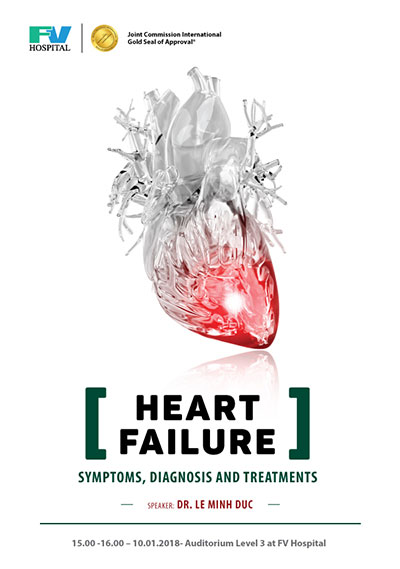According to WHO, cardiovascular diseases are the leading cause of death for all people worldwide. Every year, the number of people die from heart disease and stroke is more than the total number of people die from cancer, tuberculosis, malaria and HIV. In Vietnam, according to the report of Vietnam National Heart Association, one in three Vietnamese adults will have a risk of having cardiovascular disease, mainly heart failure. Estimated mortality rate after 1 to 5 years of heart failure patient is 30% to 50%.
What is heart failure?

Heart failure is a condition in which the heart muscle is unable to pump enough blood through to meet the body’s needs for blood and oxygen. It causes severe symptoms that make the patient hospitalized, diminishing the quality of life and increasing the rate of mortality. In the United States, there are 6 million people living with heart failure and over 900,000 thought cases diagnosed annually.

What are the symptoms of heart failure?
If you are suffering from a medical condition, pay attention to whether you have any of the following warning signs. Finding and treating heart failure at the early stage will help you to improve your health, reduce your hospitalization, and decrease your risk of death. Here are some common symptoms of heart failure:
– Feeling of difficult breathing when exercising, sitting, and lying down.
– Severe coughing, wheezing may accompany white or pink sputum.
– Signs of swollen legs, ankles, and sudden weight gain.
– Feeling of tiredness all the time, including in the daily work such as: shopping, climbing stairs, walking, etc.
– Feeling of anorexia.
– Memory loss, decreased orientation and direction, confusion.
– Regular fast heart beats and feeling of palpitations.
What is the cause of heart failure?
Cardiovascular disease is caused by many different causes, but it is mainly developed from diseases such as coronary heart disease, myocardial infarction, hypertension, cardiac valve disease, cardiomyopathy, disease congenital heart disease, pulmonary edema, diabetes mellitus, sleep apnea, anemia, and hyperthyroidism.
After listening to the patient’s symptoms mentioned above, our doctor will perform investigations such as: blood tests, chest X-ray, ECG, echocardiography, coronary angiography, cardiac magnetic resonance imaging… Afterwards, the doctor will give the most accurate diagnosis and optimal treatments for each patient.
Can heart failure be treated completely? What are the effective preventions and treatments of heart failure?

 Vi
Vi 












